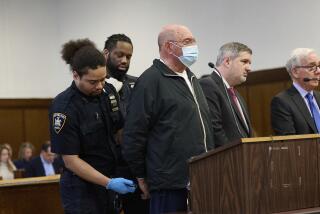Six in Princeton/Newport Case Escape Tough RICO Sentences
- Share via
NEW YORK — In a case that caused a storm of controversy over the use of the harsh federal racketeering law in white-collar crime cases, a federal judge Monday imposed brief prison sentences on five former officials of Princeton/Newport Limited Partners and a former trader for Drexel Burnham Lambert Inc.
Although all six defendants could have been sentenced to decades in prison under the Racketeer Influenced and Corrupt Organizations Act, or RICO, the judge imposed a six-month prison term on James Sutton Regan, 47, Princeton/Newport’s managing general partner. He sentenced each of the others to three months in prison. Princeton/Newport, which went out of business shortly after the charges were filed, was a securities trading partnership based in Princeton, N.J., and Newport Beach.
U.S. District Judge Robert L. Carter also imposed fines on five of the defendants, ranging from $50,000 to $275,000. But he ruled that four of them won’t have to forfeit any of the millions of dollars in salary and profits they also could have been required to give up under RICO. Carter found that because the RICO conviction of the four was based solely on relatively minor tax-law violations, forfeiture would have been cruel and unusual punishment.
The judge did, however, order forfeiture by two defendants: Charles M. Zarzecki, 41, a general partner and chief trader at Princeton/Newport, and Bruce L. Newberg, 32, the former Drexel trader. Zarzecki will have to forfeit nearly $1.4 million, and Newberg was ordered to pay $200,000.
A federal jury on July 31 convicted the six on more than 60 counts of tax fraud, mail fraud and racketeering. At the heart of the case were charges that Princeton/Newport had an illegal arrangement with Drexel and two other Wall Street firms to engage in sham trades of stocks and bonds so that Princeton/Newport could claim illegal tax writeoffs. Zarzecki and Newberg also were convicted of trying to manipulate the price of COMB Co.’s stock at Drexel’s request in 1985.
In addition to Regan, Zarzecki and Newberg, the other defendants sentenced Monday were Princeton/Newport general partners Jack Z. Rabinowitz, 42, and Paul A. Berkman, 43, and the firm’s controller, Steven B. Smotrich, 34.
Lawyers for all six have said they will appeal the convictions. The lawyers had asked the judge not to send any of the defendants to prison but instead have them perform community service. However, after the sentences were imposed, most of the defense lawyers said they were pleased that the judge didn’t impose the far harsher punishment permitted under RICO.
“The judge sentenced in a realistic fashion,” said Frederick P. Hafetz, one of Newberg’s lawyers.
Neil Cartusciello, one of the assistant U.S. attorneys who prosecuted the case, said it was his office’s policy not to comment on sentences. But he noted that “Judge Carter obviously put a great deal of care and deliberation into the sentences.”
The case led to an outcry by some lawyers and law professors over the use of RICO. Most of the charges in the Princeton/Newport indictment were for types of violations that had never before been prosecuted criminally, let alone as racketeering offenses. Some defense lawyers and legal academics have argued that the law, originally adopted to prosecute organized crime figures, was being used by prosecutors in cases for which it was never intended.
None of the Princeton/Newport defendants was suspected of having organized crime ties. The case was part of a crackdown on securities law violations brought while New York mayoral candidate Rudolph W. Giuliani was U.S. attorney in Manhattan.
Since the Princeton/Newport conviction, the Justice Department has revised its internal guidelines on using RICO, narrowing the circumstances in which the law can be used in business cases. Some lawyers say the new guidelines make it unlikely that RICO charges would have been approved if the Princeton/Newport case were brought today. Judge Carter, however, said he didn’t take into account the new Justice Department guidelines in passing sentence because they don’t categorically rule out such charges.
Defense lawyers also argued that federal prosecutors used RICO in the Princeton/Newport case as a form of revenge because the defendants had refused to cooperate in the government’s related investigation of Drexel and its former junk bond chief, Michael Milken. Prosecutors have strongly denied this. Drexel has since pleaded guilty to securities fraud charges, and Milken is awaiting trial.
The judge said he gave Regan and Smotrich harsher sentences than he normally would have given because he believes that they both lied on the witness stand during the trial. The judge said that if Regan hadn’t lied, he would have sentenced him to only three months in jail. He said he wouldn’t have sentenced Smotrich to prison at all, because as a Princeton/Newport employee he was carrying out the orders of his bosses. But Judge Carter said Smotrich “told what I believe to be some blatant lies on the witness stand.”
During the sentencing hearing, Paul Grand, Zarzecki’s lawyer, disclosed for the first time that prosecutors had filed a pre-sentencing memorandum with the judge that Grand said “implies and insinuates” that several of the defendants may also have engaged in illegal insider trading. The document was filed under seal.
Grand strongly denied that any of the defendants had been involved in insider trading. The judge said he didn’t consider any insider trading allegations when he passed sentence. Additional details weren’t available, and prosecutors declined to comment.
In addition to the prison sentences, each defendant was sentenced to two years of probation, during which they will be required to perform community service. Regan was fined $275,000; Zarzecki and Newberg were each fined $165,000; Berkman was fined $100,000, and Rabinowitz, $50,000. Smotrich wasn’t fined.
More to Read
Inside the business of entertainment
The Wide Shot brings you news, analysis and insights on everything from streaming wars to production — and what it all means for the future.
You may occasionally receive promotional content from the Los Angeles Times.










